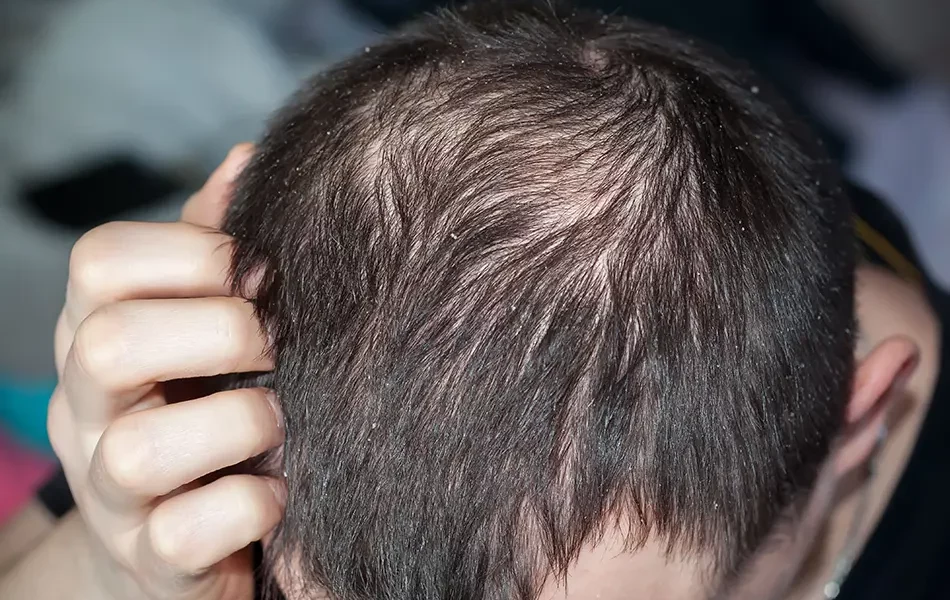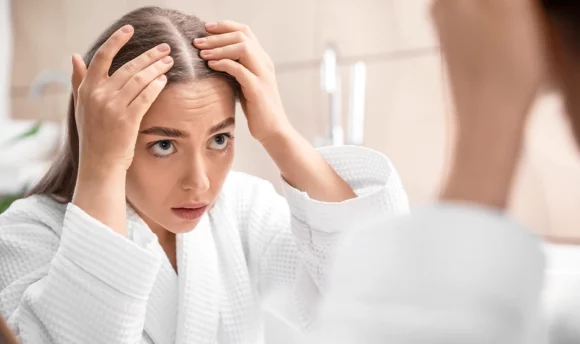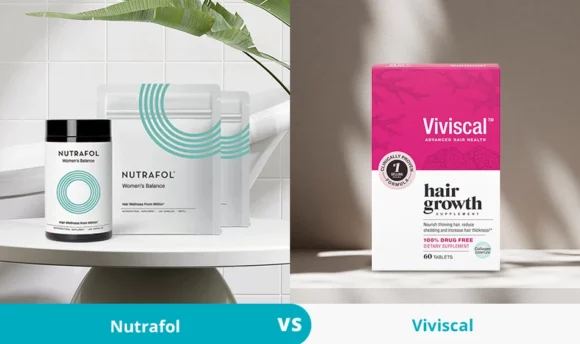Does Dandruff Cause Hair Loss? Unraveling the Link
Dandruff is a normal part of the hair and something that most people will deal with in their lifetime. But should a flaky scalp be a cause for alarm? Keep reading to find out.

The scalp is an often overlooked part of the body. With so much focus on skincare for the face and preventing split ends, it’s easy to let caring for your scalp fall by the wayside.
If you’ve noticed an increase in hair shedding along with your scalp becoming itchy and flaky, you might wonder if that’s cause for concern. Below, we’ll discuss whether the two are related and the ways in which dandruff can affect your natural hair growth.
Does Dandruff Cause Hair Loss?
No, dandruff-related hair loss isn’t common. Dandruff can cause scalp itching and temporary hair loss as a result of scratching. But mild damage to the follicles shouldn’t cause long-term hair loss.
However, conditions that cause dandruff can also cause hair loss. So if you’re experiencing itchy, inflamed skin on the scalp, it could be time to take action.
What Can Cause Dandruff and Hair Loss?
Although dandruff can’t be blamed for hair loss, there are many different conditions that can cause both dandruff and stalled hair growth. Improving your scalp health could be your first step in growing healthy hair that shines.
#1 Ringworm
Ringworm is a fungal infection that’s characterized by circular rashes that are red and itchy and that can sometimes become cracked and inflamed. This inflammation can easily lead to flaky skin that is exacerbated by itching the infection.
Fungal infections like these can go away on their own, but they’re more easily treated with medicated shampoos containing antifungals.
#2 Psoriasis of the scalp
Psoriasis is another skin condition that can lead to flaky skin and hair loss. It happens when a person’s immune system malfunctions, causing the body to regenerate skin cells before the previous ones have been shed.
You can get psoriasis anywhere on the body, but itching psoriasis sores on the scalp or attempting to remove them can cause damage to the hair follicles.
#3 Seborrheic dermatitis
Seborrheic dermatitis is a form of eczema, a common skin condition that can appear anywhere on the body. When it appears on the scalp, it causes redness, scaly patches, and flaky skin.
Many things can trigger seborrheic dermatitis, including medications, stress, and hormonal changes. It is easily treated using corticosteroid creams or, in mild cases, an anti-dandruff shampoo.
#4 Folliculitis
Folliculitis is another common condition that can affect scalp and hair health. Bacterial infections usually cause it and can lead to the hair follicles becoming red and inflamed.
When left untreated, folliculitis can leave the hair follicles vulnerable to permanent damage caused by the bacterial infection. Luckily, it is easily diagnosed by a doctor and can be treated using an antibacterial cream.
#5 Hormonal fluctuations
Changes in hormones are one of the biggest contributing factors to female and male pattern baldness and can also be linked to dandruff production.
Hormonal fluctuations – like increased progesterone levels around ovulation, can cause excess oil production on the scalp. Although oil is essential to maintaining a healthy sebum, too much can trigger the production of dandruff-producing yeasts.
Can Anti-Dandruff Shampoos Cause Hair Loss?
How an individual reacts to common ingredients in dandruff shampoo, like selenium sulfide and zinc pyrithione, will depend on their particular skin type.
Those whose skin reacts well to these anti-dandruff ingredients will likely notice an improvement in their scalp health, which can enhance hair growth and prevent hair loss.
However, some of the ingredients in medicated shampoos are known to irritate sensitive skin. When this happens, the user can experience contact dermatitis, leading to an itchy scalp, flaky and dry skin, and a possible increase in dandruff-related hair loss.
Proper use of products containing these ingredients and using them in their recommended dosages (1% and 2.5% for selenium sulfide) is essential in preventing adverse reactions that can cause more harm than good.
Best Treatment for Dandruff and Hair Loss
There are many different products that you can use to treat dandruff and restore life to dull and thinning hair. You may want to speak with a healthcare representative about the option best for you.
#1 Medical shampoo
As mentioned previously, there are many different medicated shampoo options containing mild ingredients like selenium sulfide and zinc, a mineral that is essential for scalp health. These shampoos should be targeted directly onto the scalp and left on for a minimum of 5 minutes.
Finding the right shampoo can help you restore balance to your scalp’s oil and pH levels and prevent future flare-ups of dandruff and the conditions that cause it.
#2 Hair rinsing
Using a hair rinse is typically a step that you do pre-wash to help remove excess oil and any product buildup.
Using a hair rinse infused with anti-inflammatory ingredients, such as rose water, is a great way to soothe the scalp. They can even help improve hair growth to prevent female pattern baldness.
#3 Conditioning treatments
Many hair products contain ingredients designed to soothe the skin of the scalp, restore natural pH levels, and provide some much-needed moisture.
If you’re struggling with dandruff or any other scalp conditions, consider testing out products containing sulfur, which works wonders for soothing the flaking and itchiness caused by dandruff.
#4 Topical creams
Medicated creams are often required to treat conditions such as seborrheic dermatitis, psoriasis, and fungal infections like ringworm.
Your doctor may prescribe you products containing salicylic acid, which is used to treat a wide variety of inflammatory skin conditions or something made specifically for bacterial or fungal infections.
FAQs
No, dandruff and hair loss aren’t necessarily related. However, some of the conditions that cause dandruff can also lead to hair loss, so it’s important to pay attention to the health of your scalp.
No, anti-dandruff shampoo shouldn’t cause hair loss. Generally, their medicated ingredients are mild and soothing for the scalp.
A Word From a Trichologist
Many skin conditions that cause hair loss and dandruff won’t cause permanent damage, but only if they’re treated quickly and using the right product.
If you’re suffering from severe dandruff or experience burning sensations on your scalp, it’s important to get medical attention to prevent more permanent hair loss in the future.
A dermatologist will be able to properly identify the root cause of scalp discomfort and get you set up with the product that is best suited to treat your specific condition.
Although there are plenty of home remedies that you can use to temporarily alleviate discomfort, don’t be afraid to seek help from a medical professional.
Conclusion
Although dandruff isn’t the root cause of thinning hair and hair loss, many of the same medical conditions that cause dandruff can also affect the health of your scalp, leading to hair loss.
Several different conditions could be causing your dandruff, ranging from fungal to bacterial infections. If you’re experiencing scalp distress, don’t be afraid to contact a medical professional to diagnose your specific ailment and help you get started with a treatment plan.

















































 Select your language:
Select your language: 








